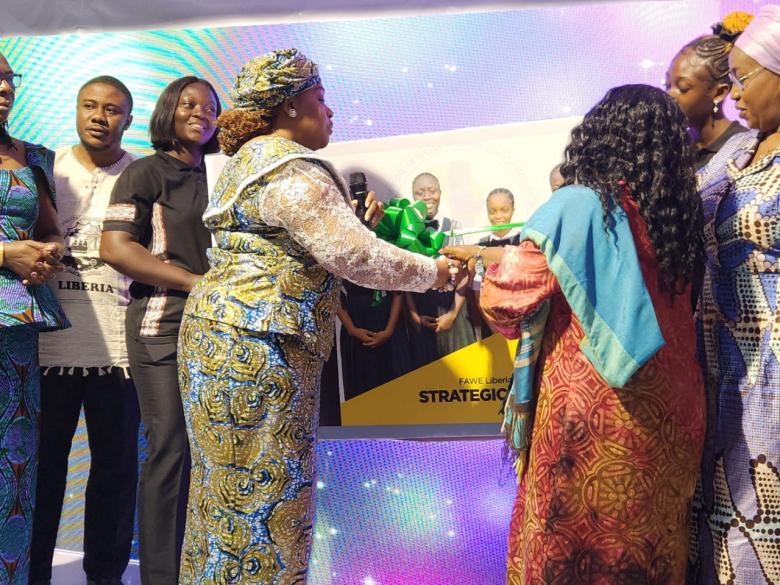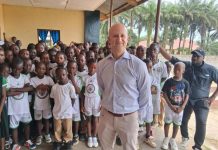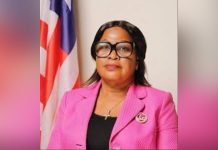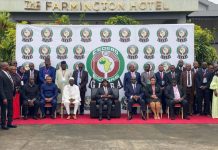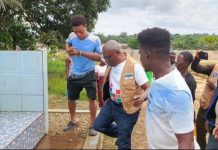Africa-Press – Liberia. Liberia’s Minister of Education, Dr. Jarso Maley Jallah has hit the nail on the head as she raises red flag over what she described as decades of systemic exclusion in the country’s education sector, particularly for girls, youth with disabilities, refugees, and young people from low-income communities.
Dr. Jallah pointed out that unless the country can make amends to change this negative, human resource development, especially for the underprivileged, who constitute a higher portion of the fabric of this country, would stagnate and development would dwindle.
Min. Jallah made these comments when she served as the keynote speaker and chief launcher of the the FAWE–Mastercard Foundation Second Chance Program Phase II, a landmark seven-year, US$17 M program that is based on work plan and implementation – a regional initiative that now extends to Liberia and nine other African countries.
At the occasion well-attended by policymakers, educators, youth leaders, and international partners, Dr. Jallah reflected on Liberia’s long-standing promise to protect and empower girls, a promise first made in 1998 when FAWE Liberia was launched at the Ministry of Education.
“Twenty-seven years later, that promise remains, but so does the unfinished work. In Liberia, talent is abundant, but opportunity is not. Potential is broad, but access is narrow. And for too many of our young people, especially girls, youth with disabilities, and those from refugee and low-income communities, the system has been structured to make success the exception, not the norm. These young people are not failing; systems have historically failed them. They are not “dropping out”; they are being pushed out. This is the context that makes Phase II not just important, but urgent,” she told the gathering.
“The FAWE-Mastercard Foundation partnership is not a charity. It is not benevolence. It is a course correction; a deliberate attempt to repair pathways that should never have been blocked in the first place. Phase I showed us what happens when young people, especially marginalized girls, are met with real investment. These results are not small successes; they are proof-of-concept.”
The Minister framed the Second Chance Program as a strategic intervention to repair the very pathways that have long been closed for marginalized youth, stressing, “This partnership is not charity. It is a course correction.”
“Too many doors in Liberia close too early and too permanently. A young woman misses one exam and loses a lifetime opportunity. A talented boy can’t enroll in TVET because fees are too high. A youth with a disability completes secondary school only to find dead ends afterward.”
Liberia’s share of the program will target 1,100 marginalized young people, connecting them to higher education, technical and vocational training, STEM fields, entrepreneurship, and dignified work across 21 universities and 35 TVET institutions.
But the Minister was equally clear, noting that while external support is essential, responsibility for lasting reform rests with Liberia.
She tied the effort to President Joseph Nyuma Boakai’s ARREST Agenda, outlining national commitments to gender-responsive schools, strengthened TVET and university systems, and curricula aligned with market needs.
FAWE Africa Board Member Oley Dibba emphasized that Liberia’s future strength lies in its youth and not in natural resources.
“There have been structural barriers—not failures—for our young women and girls,” she said.
“Interruption is not failure. This program presents a platform where every young person can thrive.”
She reaffirmed FAWE Africa’s commitment to supporting girls, marginalized youth, and underserved communities across the continent.
Also in remarks, FAWE Liberia Board Chair Dr. Meima Sirleaf-Kanneh described the launch as a transformative moment for a country still recovering from conflict and inequality.
The program will reach more than 1,000 marginalized youth, with 80% of beneficiaries being girls.
This program, according to her, will operate across all 15 counties and deliberately focus on remote border towns, refugee communities, low-income rural areas and youth with disabilities
Dr. Sirleaf-Kanneh stressed that the purpose goes beyond formal learning.
“We want to reach the poorest of the poor. This is not FAWE’s program—it is Liberia’s program. It is the people’s program.”
She also detailed plans to push more girls into non-traditional fields such as engineering and STEM, supported by gender-responsive teaching practices.
Taking the podium, Youth and Sports Minister Cllr. Jeror Cole Bangalu, hailed the initiative as an important tool for expanding opportunities for both boys and girls.
“This is more than a ceremony. It aligns with the ARREST Agenda and offers the mentorship and support young people need to pursue education without barriers,” he pointed out.
He urged all stakeholders to invest in gender-responsive, youth-centered educational programs.
FAWE Liberia Executive Director, Mr. Millias Z. Sheriff traced the program’s origins – from initial pilots in Ethiopia, Zambia, and Uganda to its expansion into 10 African countries, now including Liberia.
He indicated that in Liberia, implementation will focus on higher-education access programs, bridging and transition models, gender-responsive curricula, intensive mentorship and business support and industry linkages
“Our goal is to expand young people’s pathways to dignified and fulfilling jobs,” Sheriff said. “This is your program.”
FAWE Africa Executive Director, Dr. Martha Muhwezi in comments, reflected on the transformative power of education, quoting George Washington Carver that: “Education is the key to unlock the golden door of freedom.”
She shared her own story of having to repeat primary school despite passing—a second chance that shaped her life.
“This journey we begin today is toward a Liberia where every girl who wants to learn can learn, and every young woman who wants to advance can advance.”
Dr. Muhwezi among other things urged partners not to work in silos but to act with purpose and unity.
For More News And Analysis About Liberia Follow Africa-Press

